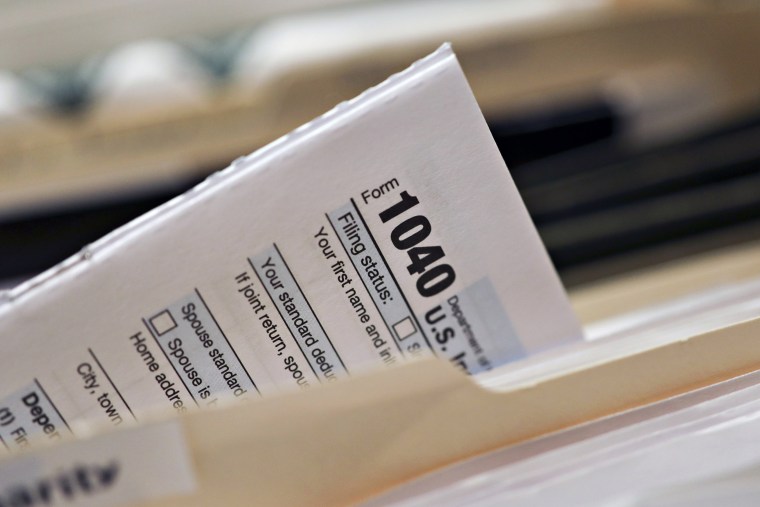Filing taxes looks a little different this year, said Ed Arcara, a Certified Public Accountant in Buffalo, New York. To reduce the risk of coronavirus transmission, he’s been meeting some of his elderly clients in the parking lots of their nursing homes. Others have been leaving paperwork and forms in the dropbox by the office door. He and his staff communicate with these clients through the glass window.
“It’s been a lot of hand gestures. A lot of thumbs up,” Arcara said.
For them and for everyone else in America, July 15 is the IRS tax filing deadline, moved back from April 15 due to the COVID-19 pandemic. Here’s what you need to know.
Even with the deadline extension, taxpayers may be feeling a little extra harried this year from living under stay-at-home orders with their families. Finding those loose receipts can be tougher when home offices may be in disarray and perhaps being shared with a spouse or children.
“First, don’t panic,” said Lisa Greene-Lewis, CPA and a tax expert for TurboTax. Filers have up until 11:59 pm Wednesday night to file.
If you need a little more time to get your return together, as usual you can easily request extending your filing deadline to October with no penalty. But if you owe taxes you need to make an estimated payment now or you could face penalties. If you overestimate, you’ll eventually get it back as a refund. If you underestimate, you’ll still owe the difference but face fewer penalties. If you’re unable to pay the full amount owed, try to pay something to reduce the balance. You can also request a payment plan which can allow you to take up to 72 months to pay.
Most states also moved their state tax deadline to match the moved federal date, but a handful did not. For instance, Idaho’s was earlier, June 15, while Iowa’s is later, July 31. Check your state guidelines.
In light of looming economic uncertainty, it's more important than ever to use your refund wisely — and not splurge on discretionary items you couldn’t otherwise afford.
As you or your prepare finalize your taxes, make sure you get all the deductions and credits for which you’re eligible. Many filers miss the Saver’s Credit, a tax credit for making eligible contributions to your IRA or employer-sponsored retirement plan, said Greene-Lewis. Don’t forget the Earned Income Tax Credit either, worth up to over $6,000 for a family with three kids.
Self-employed persons filing on a Schedule C should note that the application deadline for the Paycheck Protection Program has been extended to August 8 and they can use the income shown on their 2019 tax return to qualify. Check with your accountant and lender.
After being able to make the filing deadline, the second thing taxpayers worry about is when they’ll get their refund check. The fastest way to get a refund is to e-file with direct deposit. But if you’re owed a refund and file by mail, be prepared to wait. The IRS has a huge backlog. You may also get two checks, one for the refund and one for the interest on the refund. If you filed after April and are getting a refund, you’re likely to be getting two checks. The second one will likely be for under $50. The IRS has an online refund tracker, updated daily.
The latest report by the IRS National Taxpayer Advocate, Erin M. Collins, who represents filers, says there have been lengthy delays in refunds due to audits, more than half of which are false positives. Taxpayers have been asked to mail in additional documents, but the IRS can’t process them, Collins wrote. This falls harshly on lower-income taxpayers for whom the annual refund is a significant part of their income.
“The IRS has been affected by COVID like everyone else,” said Garret Wagner, CPA. “We’ve seen tremendous delay in amended tax returns, which can’t be filed electronically. People who mailed in late March haven’t heard a peep back.” He believes the agency will speed up as it orders more employees to return to work and the processing of physical returns resumes.
Once you get your refund, personal finance experts say it’s more important than ever this year, in light of looming economic uncertainty, to use it wisely and not splurge on discretionary items you couldn’t otherwise afford.
“Use your tax refund to catch up on, or stay current with, bills that didn’t offer any payment relief,” said Greg McBride, chief financial analyst for Bankrate.com.
“After that, pad your emergency savings. Debt repayment is a positive financial step, but takes a back seat to the building up an emergency cushion that can better weather the unknown that lies ahead.”

